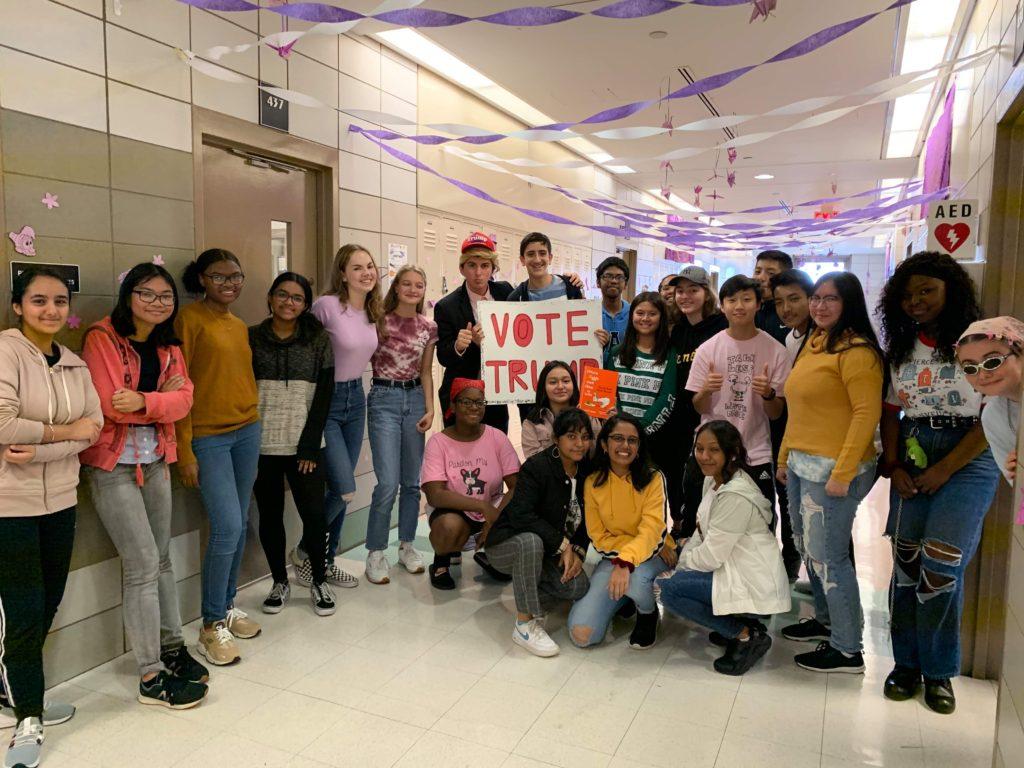
The annual THHS Election Simulation ended last month. Besides the new array of candidates from the coming primary, this simulation entailed new features that added twists to the classic election sim experience.
This year, two AP Government classes took upon the role of the Federal Election Commission (FEC). Seniors Tasnimul Taher and Shannon Thomas, Presidents of the Band 8 FEC, stated, “The new FEC classes were a change from prior years…it used to be the Leadership class.” They continued to describe new circumstances for the 2019 simulation. “This year, there were two AP Gov Classes as the FEC. Band 8 monitored candidates and band 9 worked with the special interest groups.”
These FEC classes emulated the real-life FEC by working with the logistics and legality of the election, fining campaigns and interest groups for any broken rules. Candidates and special interest groups were required to follow FEC regulations for advertising and promotions, among others.
“Throughout the Election Simulation, we worked with the circulation of Simbucks and their distribution. This mimicked the real FEC, which is responsible for combating corruption within campaigns and combating counterfeit money. As chairperson, I audited transactions and campaign balances, voter registration, and worked as a commissioner,” Tasnimul explained.
This new addition received mixed reactions among students. Some believed that the fines passed by the FEC were too high and unfair.
Senior Idalia DiNapoli, who represented Kamala Harris in the Election Simulation, described the predicament of her campaign team when they were charged with high fines. She said, “My campaign received an $850 fine for the use of electronics at a bake sale, as well as overstaying and failure to make sure each student wrote their name on their simbucks …That was practically all the money my campaign had, so there wasn’t really much we could do after.”
Due to these complaints, the FEC modified their regulations for fining candidates and interest groups by enforcing an additional round of approval from teachers. Nevertheless, the addition of the FEC classes generated more interest and attention towards the financial aspect of elections. Tasnimul added, “Much of the monetary perspective of elections is overlooked but with these FEC classes, we were able to learn the ways of government oversight on campaigns.”
Another change in the Election Simulation was the representation of candidates. For the first time in Townsend Harris history, a senior represented a candidate of the opposite gender— senior Osiris Guerrero played Senator Bernie Sanders.
At Townsend Harris, females make up the majority of the student body, so it was not a surprise to senior Isaura Santos, who played Elizabeth Warren. She explained, “It made sense because … government classes may not always have male students who are [willing] to play a certain candidate.”
Osiris was thrilled by the experience. “Portraying an opposing gender in this year’s simulation was interesting because it had never been done before,” she said. “It’s crazy knowing that I was the first one to do so. The majority of our school is female and since in politics, candidates are usually male, I wanted to break norms and portray Bernie Sanders.”
With these new changes, the Election Simulation wrapped up after a full swing of candidate and interest group classroom visits, radio and TV shows, and decorated hallways lined with posters. On November 12th, students participated in a schoolwide vote where Donald Trump was elected as the Republican primary candidate and Pete Buttigieg as the Democratic primary candidate.




























